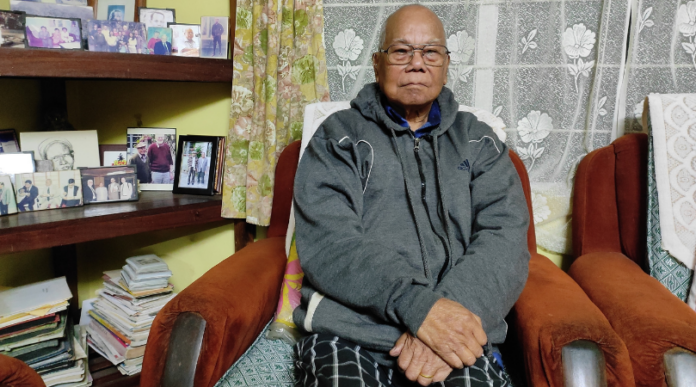Eleanor Sangma
TURA:
For the better part of two days, Tura looked like a ghost town. Shops closed, streets empty save for a few cars, it almost looked like the townsfolk had just up and left. On the second day, a downpour made the scenario even more haunting.
Several pressure groups had called for a two-day strike last week. The reason? A fight for tribal identity, is what they claim. Their demand is the ouster of newly elected Chief Executive Member of GHADC, Rakesh A Sangma. Being borne to a Garo mother and a non-Garo father, his identity is being questioned and contested by several groups including the GSU, FKJGP, AYWO, ADE and FAF. They claim that an individual who has little understanding of the Garo culture cannot be in such a position of power.
The Northeastern region in general, which is made up of many small tribes, has long since been plagued with a fear of outsiders. Due to a history of threats posed by immigration and an eventual cultural assimilation, people from the Hills fear they might become minorities in their own land. In a small state like Meghalaya, this fear has manifested itself in a fiercely protective stance against products of inter-community marriages in recent years, at least in the political scenario.
According to the age-old customs of the Garo community, there is no mention of inter-community unions, stated historian and ex-Vice Chancellor of NEHU (Tura), Dr Milton Sangma. “The one tradition that our ancestors explicitly agreed upon was that family lineage would be traced through women,” Sangma told The Meghalayan. He then stated, “The question of ‘Who is a Garo’ is still unsolved till today.”
Our ancestors lived with their own customs and traditions; only with the arrival of the British did the Garo society become complicated. The British government brought outsiders with the promise of job opportunities as not a single Garo was educated enough to work in the offices during that period, according to Sangma. So, outsiders filtered in and settled here as clerks, peons, surveyors, among others. With the course of time, inter marriages took place. Till now, there has been no clear-cut decision regarding mixed marriages and the offspring of such unions, although attempts have been made.
Sangma was the Chairman of the committee for Codification of Garo Customary Laws and Practices, 2003. The committee worked for nearly two years in order to record and codify Garo laws and traditions that have been in practice. Starting with a questionnaire that covered all possible aspects of the Garo society such as inheritance, marriage and divorce, it was distributed to various sections of the community ranging from the general public, to NGOs and Nokmas. The response was underwhelming, even from the side of Garo advocates. Nevertheless, the committee submitted a draft to the District Council with a recommendation to answer the question of who could be considered a Garo. The committee’s recommendation was that if the child is born to a Garo mother and a non-Garo father, he or she would take the mother’s last name and be considered Garo; and if the child has lived like a Garo throughout his or her life and fully understands the culture, the child can be considered Garo as long as it is accepted by the concerned clan. “According to old Garo customs, a non-tribal can be adopted into a clan,” Sangma stated.
For a couple of years after its submission, the draft sat gathering dust in the office. “Everyone must have been agonising over that one question regarding the identity of a Garo, hence the delay,” the historian elaborated. Finally reaching the Governor’s office, it was approved but “with minor corrections.” The procedure for such a situation called for the setting up of a small committee for reviewing and making corrections. This important step was neglected and a second codification committee was set up. This new committee sent another draft with the addition of a new clause stating that to be a Garo, both the parents must have Garo blood. This draft was then returned by the District Council Affairs Department as the correct procedure was not followed. The issue of the Garo Customary Law has since been hanging in the air, with no solid decisions made.
“If we go back to our history, there have been union with different communities since the beginning. It’s becoming an issue in recent years because of people in spotlight, especially in politics,” explained Sangma. He stated that unless and until the community as a whole consciously decides what to do with this issue, problems are going to keep arising. The codification and hence the question of the Garo tribal identity, can be approved only when everyone comes to a mutual understanding. He urges the District Council to settle the matter with all interested parties taking part in the process.
“Our ancestors are all gone now, leaving us with no instructions on how to tackle such issues. As people living in the here and now, it is our responsibility to come up with new solutions for new problems,” the historian added.


